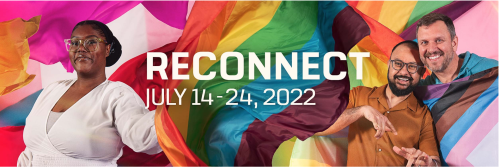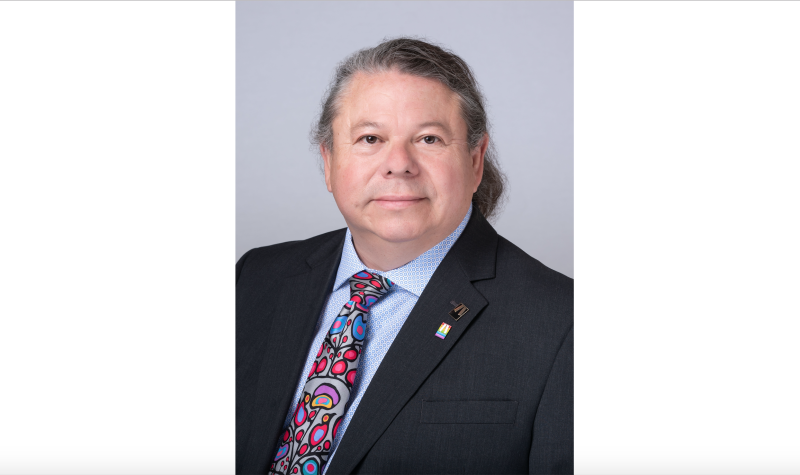The 11-day Halifax Pride Festival is taking place from July 14-24 and this year's Pride Ambassador has been selected.
Each year, the Halifax Pride Society celebrates the positive impact of an individual or group within the 2SLGBTQ+ community, this year they announced Tuma Young as the 2022 Halifax Pride Ambassador.
Tuma Young is a noted leader in Indigenous, Queer, and Two-Spirit communities and has been deeply involved with HIV/AIDS activism.
History and accomplishments
Young grew up in a traditional manner on the Malagawatch First Nation, and co-founded the Wabanaki Two-Spirit Alliance and continues to serve on the board. The goal behind the alliance is to represent the emotional, spiritual, mental and physical well-being and interests of Two-Spirits and Indigenous LGBTQ+ individuals and groups in Wabanaki Territory. Young also prefers the use of nek'm—a Mi'kmaw word meaning "she" or "he" —for their pronoun.
Last June, he concluded his term on the Executive of the Nova Scotia Barristers’ Society (NSBS) where he became the first First Nation person to hold the position of President of any law society in Canada, and also the first openly Two-Spirit person to become the President of the NSBS.
Currently a professor and researcher of Mi'kmaq Studies at Cape Breton University, Young is also the first Mi’kmaq-speaking lawyer in Nova Scotia.
“I’ve just been doing this all my life, I came out when I was about 10. Growing up, I would look around and say why aren’t there any gays and lesbians in my communities or anywhere else because there were just none.”
Young said there wasn’t available information or awareness when it came to LGBTQ+ education and that’s when he got involved with HIV AIDS education and started up HIV Aids education in Mi’kmaq communities, across Atlantic Canada and other provinces.
At the time, Young worked for the Stepping Stone, a street outreach service in Halifax, but wanted to do more for the community and decided to pursue post-secondary studies. He received his law degree from the University of British Columbia in 2001 and later pursued a master's in Indigenous peoples law and governance at the University of Arizona.
Working as a lawyer, he wanted to address the suicide crisis happening in the Mi'kmaq communities.
“We formed a suicide intervention group, we brought in therapists and training and did all the right things.”
Young decided to be more involved and felt more steps were necessary for two-spirited people.
“In 2011, we held a gathering at Liscombe Lodge with 55 two-spirited people and instead of doing suicide intervention or training prevention, we said we're going to show people what their roles are as two-spirited people in the communities so that they don't leave and go to big cities, or commit suicide.”
In 2011, the gathering at the lodge lead to Young co-founding the Wabanaki Two-Spirit Alliance along with business partner John Sylliboy.
Today, as a member of the Eskasoni First Nation,Young said the community has progressed when it comes to LGBTQ+ acceptance and open discussions.
“When I first came out, there was an absolute nobody. It was still illegal to be gay, you can be fired for that."
“When I first came out, there was an absolute nobody. It was still illegal to be gay, you can be fired for that. In my first pride march in 1988, some people had to wear a mask because they were provincial government employees so they could be identified.”
Although it was a slow and challenging process, the Esaksoni community started to openly share and discuss two-spirited education.
“The conversation had to occur during the HIV/AIDS crisis. We talked about HIV and AIDS, safer sex, injection and drug use. It took courage to stand up to elders who were maybe teaching about homophobia from their own experiences of the Indian residential schools day schools.”
Eskasoni Indian Day School
Young is a residential day school survivor and spent ten years in an Eskasoni Indian Day school.
"All the same curriculum approaches and abuses that happened at residential school, happened at the Indian day schools."
“All the same curriculum approaches and abuses that happened at residential school, happened at the Indian day schools, in fact, the only difference was that we got to go home at night.”
Young said the curriculum approach was not primarily educational, but more fitted to preparing them to become domestics or labourers. They were taught how to operate a farm and to learn labour and carpentry work, without offering a lot of academic education.
“When I left the Indian day school in grade six, and went to grade seven, I found that I was about two to three years behind. Instead of having a grade six education, I probably had a grade three one.”
Young added that is the reason many Indigenous community members drop out of Canadian school after moving out of reserves.
“They all dropped out, and people blame them but they didn't blame the system. Nobody looked at the system and realized that the Indian school's curriculum was vastly behind.”
Halifax Pride Parade
Young said the pride parade was important because it’s a way of giving back to the community.
“I also need to acknowledge the fact that we celebrate our own wholeness, and that we do not have to give up our own newness, or our identity as Indigenous people to be part of the queer community or the LGBTQ+ community. We celebrate who we all are. That's what it really means.”
Although the Eskasoni community and other Indigenous communities have come a long way when it comes to LGBTQ+ rights, Young encourages the public to educate themselves on Indigenous treaties.
“We need to have workshops on reconciliation, and murdered and missing Indigenous women's calls for justice, because a lot of those murdered and missing Indigenous women and girls were actually trans women.”
“It's not enough to stand here and say we are on Mi’kmaq land. That's a start.”
Other Indigenous issues Young addresses were the 215 mass graves found in Kamloops, and the other thousands of graves that have been discovered across Canada since.
“We must never forget where we come from and how difficult it was to get here.”
The pride parade is scheduled for Saturday, July 16. The festival will include performances and a variety of events that will take place at the Garrison Grounds Festival Site near Citadel Hill.
Visit the Halifax pride website to learn more about the upcoming pride events and schedules.

The Halifax Pride Festival is taking place from July 14 until July 24. Photo from Halifax Pride.
Listen to the full interview below:


